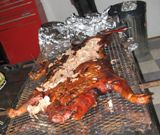Whole Hog
Permanent link All Posts

Ghosts of barbeques past...
My sometimes-combative relationship with food started during The Great Squash-Off of 1985. I was eight, my friend Bevin was over for dinner, and we were told we had to try to the squash. This was the first time in my life my dad insisted I eat something I didn’t want.
Bevin smashed her squash into her potatoes and encouraged me to do the same—she was always a bit more diplomatic than I. We were about to miss The Cosby Show and Family Ties and it was, after all, only one bite. But I knew. If I tried it, I would be taking bites of things I didn’t want for the rest of my life. Eggs, sloppy Joes, kitten toes…
My dad held his ground. Bevin was driven home, I missed my TV shows and I sat there looking at the cold lump of squash until bedtime. But I won and was never again asked to take a bite of something I didn’t want.
Since that fateful Thursday in the 80s, I have maintained self-imposed dietary restrictions, mostly involving condiments, foods that are white and foods that are not clearly a liquid or a solid. And recently I made the transition from picky eater to picky vegetarian.
It’s been interesting trying to explain my decision, and it’s gotten me thinking about people who keep kosher. People get that keeping kosher is about religion and tradition, so not many people ask why when someone says they follow a kosher diet. However, I’m someone who was spotted at a fourth of July pig roast just last summer eating directly from the pig’s body—so I understand where they’re coming from when people ask why.

Yes, that's THE whole hog
Despite my not-so-distant past as a bacon-lover—and my hesitation to talk about them at the risk of sounding preachy—I do have strong beliefs: I think that the way most animals being raised for food are treated is terrible. The meat production industry is repulsive. The toll of meat production on the environment scares me. And the older I get, the more trouble I have with the idea of eating something that once was alive.
Unlike people who keep kosher, my beliefs have nothing to do with religion or with tradition. They are personal and political and have more to do with how I’m becoming the person I want to be. But, for the first time, I understand a little more about what it means to keep kosher; not just the logistics, but the feeling you get from choosing to live a certain way, even when it’s difficult, because you believe in something.
A few weeks ago, I went to my first Cubs game of the year. I used to love (and honestly, I still love them, but now from afar) hot dogs and looked forward to my first ballpark dog each season. But this year, sitting in my little green seat with a pretzel that managed to have the consistency of both sawdust and paste, I was envious—at a very base level—of the kosher diet, which allows for all the Vienna beef you want.
But I get it now, I think, the difference between being a picky, stubborn squash-hater and choosing not to eat something I like because of what I believe in. So until Wrigley steps up with a veggie dog, I’ll have to be content with my pretzel.



.jpg)



